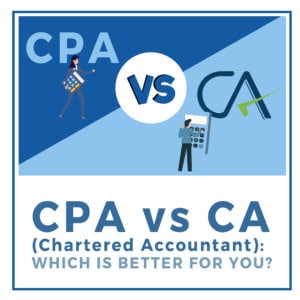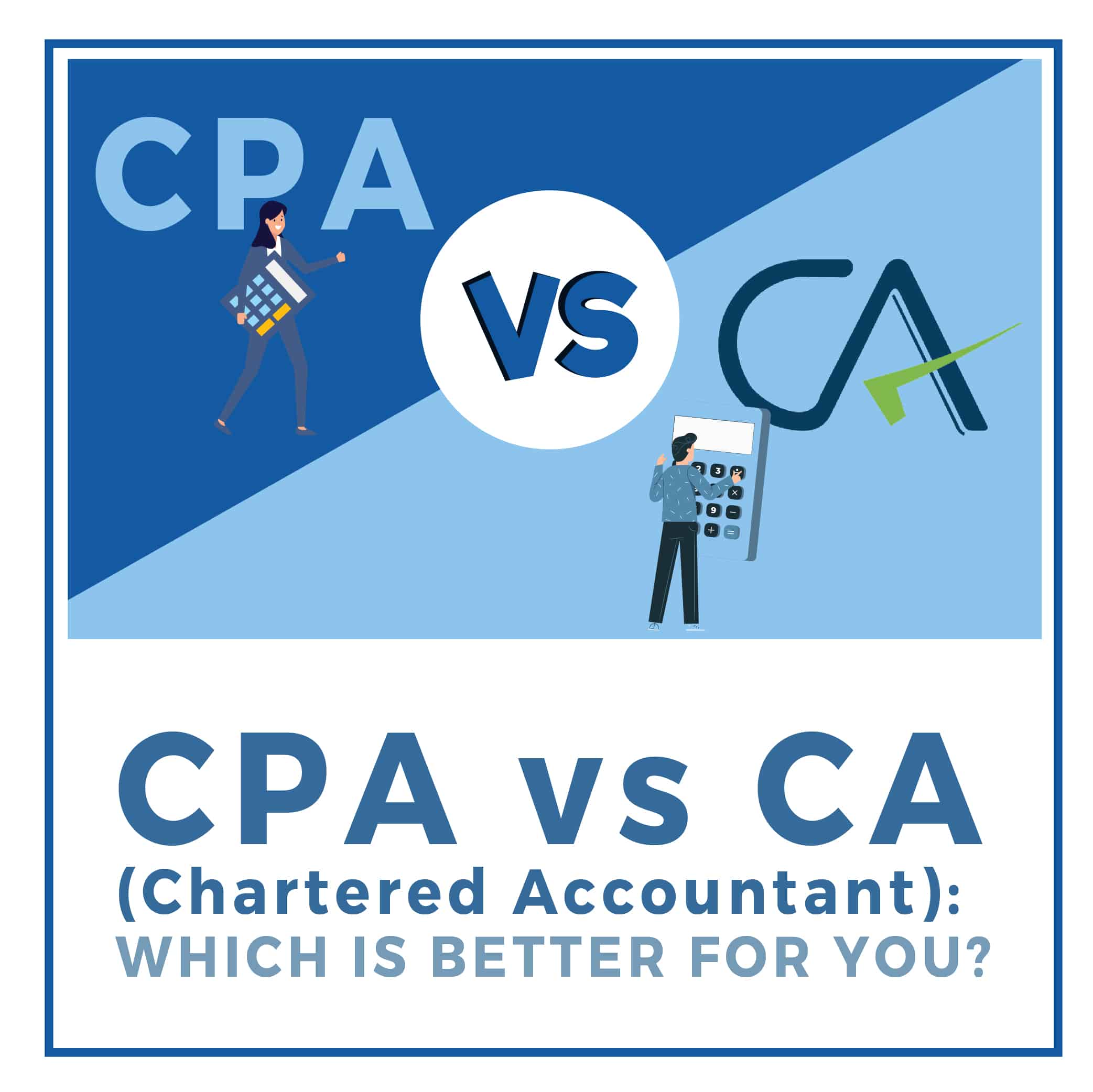Which is better? Which designation will help your career? When deciding your choice of profession in accountancy, you may be in a dilemma to choose between CPA or CA.
The key question that arises is whether CPA benefits your career path or CA? There is no clear winner because both qualifications will help to grow your technical skills, accountancy skills and business management skills. Also, CPA and CA holders tend to be equally spread across commercial and public accounting – so each qualification provides maximum flexibility to work across industry.
Let’s take a look at what each of these certifications entail and the major differences between the two.
What is a CPA?
A Certified Public Accountant is a professional who have passed the CPA exam given by the American Institute of Certified Public Accountants (AICPA) and fulfilled all of the education and work experience requirements associated with taking the exam.
These professionals are experts in US GAAP, US federal income tax, and several other areas of US accounting and financial law such as auditing. Although this certification is respected around the world, it’s a US designation certifying that the professional is competent in US accounting and able to perform auditing and taxation tasks that other professionals are not allowed to do.
What is a CA?
A Chartered Accountant (CA) is a professional who has passed the CA exam and the required education in his or her country of certification.
There are many organizations that provide education and examination for CAs. A few examples include the Institute of Chartered Accountants of Scotland (ICAS), the Institute of Chartered Accountants in England and Wales (ICAEW), Institute of Chartered Accountants of India (ICAI) and the Canadian Institute of Chartered Accountants (CICA.)
Chartered Accountants in Canada, Australia, New Zealand, Mexico and Ireland have a reciprocity agreement with the United States. If they can pass an equivalency exam, they can work in the U.S. as CPAs.
CAs are experts in IFRS and other international accounting standards. Though they may have a good grasp on US GAAP, they aren’t as trained in this area as CPAs are.
Which is better? Which designation will help your career? When deciding your choice of profession in accountancy, you may be in a dilemma to choose between CPA or CA.
The key question that arises is whether CPA benefits your career path or CA? There is no clear winner because both qualifications will help to grow your technical skills, accountancy skills and business management skills. Also, CPA and CA holders tend to be equally spread across commercial and public accounting – so each qualification provides maximum flexibility to work across industry.
Let’s take a look at what each of these certifications entail and the major differences between the two.
CPA vs CA: Career Path
The CPA designation will open up a lot of career options for you. After getting your CPA certification you can work under various accounting fields such as International Accounting, Internal & External Auditing, Consulting Services, Forensic Accounting, Assurance services, Taxation & Financial Planning etc. With its global recognition, you will find the best place to work anywhere in many countries.
Similarly, CA Designation will also provide you many options in the specialized areas of Accounting such as Auditing, Taxation, Corporate Finance, Corporate Law. After getting your CA Certification you can either work in the existing top firms of Accountancy or you can start your own independent professional practice.
CPA vs CA: Salaries
Both CPAs and CAs salaries depend on your geographic location, job title, and years of experience. Thus, they vary drastically.
The median salary for a CPA in the U.S. is $62,410 and the median salary for a CA in the U.K. is £34,637 ($44,849 USD). Both certifications have large salary upward mobility and can each make $150,000 or more each year depending on the position and level of experience.
CPA vs CA: Time Requirements
It’s a little more straightforward to become a CPA in terms of time requirements. You must have completed 150 undergraduate credit hours and you must also have worked a given number of hours under the direct supervision of a CPA. You then have 18 months to sit for and pass all four parts of the CPA exam. So, it could take about 8 1/2 years to become a CPA (five years of undergraduate work, two years on the job and 18 months to pass the CPA exam).
How long it takes to become a CA depends on what country you plan to practice in and your level of education and professional experience. As an example, the ICAS has four options:
- Direct entry route for school-leavers, which requires five years of training with an ICAS-approved employer;
- Graduate entry route for university graduates, which requires three years of training with an ICAS-approved employer;
- Professional entry route for experienced finance professionals is for established professionals with a university degree (formally recognized as a UK equivalent) or five years of relevant work experience and
- The pathways route that allows members of The Chartered Institute of Public Finance and Accountancy (CIPFA) the opportunity to become a member of ICAS and earn CA designation.
There are two pathways; one measures relevant expertise and the other, practical competence. Both pathways require seven years of post-qualification experience.
The best “apples-to-apples” comparison would be CPA = ICAS Pathway #2.
CPA vs CA: Certification Costs and Requirements
How much it costs to get your CPA license is variable. All states require that you earn a minimum of a bachelor’s degree in accounting or business with including a number of required courses. Almost all states require that you earn at least 150 credit hours as well. Thus, your CPA educational requires will vary depending on if you pursue a master’s degree to earn your last 25 college credit hours or simply take more classes in your undergraduate degree program.
The certification process itself will cost about $3,000 including a proper CPA review course and exam fees. After you pass the exam, you will also need to keep your license valid with continuing education credits each year. These vary in price but most cost between $50-$100 per credit hour. Most states require around 40 credits per year. Don’t worry though. If you get a job at a public accounting firm, they will pay for your continuing education.
The cost for becoming a CA depends on the country you live in, your education and work experience and what organization you are applying to for obtaining your credential.
For example, if you are applying to ICAS and you choose Pathways #1 and #2 (direct entry from school or university) then your employer will cover the costs. If you opt for Pathway #3 (Experienced Professional), the costs are roughly £5,750 – £13,900. Pathway #4 (for CIPFA members) costs are £1,035 for the Relevant Expertise Pathway.
For the Practical Competence Pathway, the costs are: £596 for the training contract; £1,547 – £1,935 for class fees; £292 for the exam fee and £495 for annual ICAS/CIPFA membership dues. If there are continuing education and licensing requirements, they will be determined by the country in which you are working.
So, Which is Better for You?
If you are interested in working abroad or in a multinational company, then you should opt for CPA. You can learn more about the best CPA prep courses here. Alternatively, if you want to start your own audit practice in India, opt for CA. Additionally, the CA exam is less costly as compared to the the CPA examination.
Neither one of these certifications are better than the other. They are simply different and used for different purposes. You can expect to make about the same salary with both credentials given that the location, job position, company, and work experience are the same. It really comes down to what you want to do and where you want to work.











